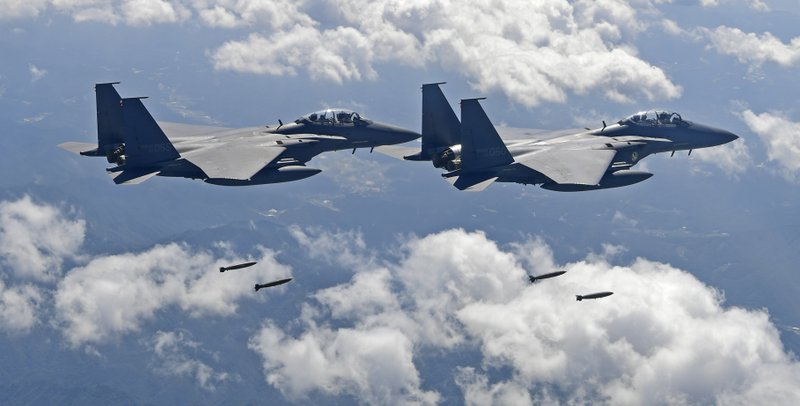SEOUL, South Korea -- The U.S. military flew advanced bombers and stealth jets over the Korean Peninsula and near Japan in drills with South Korean and Japanese warplanes on Monday, three days after North Korea fired a missile over Japan.
The United States often sends powerful military aircraft in a show of force in times of heightened tension with North Korea.
The North launched its latest missile as it protested against tough new United Nations sanctions over its sixth nuclear test on Sept. 3.
Monday's peninsula flyovers involved two B-1Bs and four F-35Bs from the U.S. military and four F-15K fighter jets from South Korea, according to the South Korean and U.S. militaries.
The U.S. and South Korean planes practiced attacks by releasing live weapons at a firing range in South Korea, the U.S. Pacific Command said in a statement.
The U.S. warplanes also conducted formation training with Japanese fighter jets over waters near Japan's southern Kyushu Island, according to the Pacific Command.
Defense Secretary James Mattis, speaking to reporters at the Pentagon, said the U.S. has not attempted to shoot down any of North Korea's missiles -- including two that have recently overflown Japan -- because they have not posed a direct threat.
Mattis said U.S. and Japanese missile defenses have been ready to respond but were not needed.
If a North Korean missile were to threaten U.S. or Japanese territory, he said, "that would elicit a different response from us."
He said North Korea is deliberately carrying out tests that come as close as possible to provoking the U.S. without drawing a military response.
Since Kim Jong Un took power in North Korea in late 2011, his nation has tested weapons at a torrid pace. The country flight-tested two intercontinental ballistic missiles in July.
Its nuclear test in September was its most powerful to date.
Many experts say it's only a matter of time until Kim achieves his stated objective of possessing reliable nuclear-tipped missiles capable of striking anywhere in the mainland U.S.
State media on Saturday quoted Kim as saying that North Korea's final goal "is to establish the equilibrium of real force with the U.S. and make the U.S. rulers dare not talk about military option" for the North.
Alarmed by North Korea's advancing weapons programs, many conservatives in South Korea have called for the reintroduction of U.S. tactical nuclear weapons there.
The liberal-leaning government of President Moon Jae-in said it has no intention of requesting that the U.S. bring back such weapons.
South Korean Defense Minister Song Young-moo told lawmakers on Monday that it is "not proper" to reintroduce U.S. nuclear weapons.
He previously said the idea should be "deeply considered" by the allies.
Meanwhile, China's Communist Party newspaper on Monday criticized the United States for demanding that Beijing put more pressure on North Korea to rein in its weapons programs.
"The so-called 'China's responsibility theory' is essentially moral kidnapping," the People's Daily said in a commentary. It also noted that sanctions should not harm "legitimate economic and trade exchanges between North Korea and the outside world" and the lives of everyday people.
China accounts for about 90 percent of North Korea's trade and sends largely free crude oil shipments to the North.
Beijing has been increasingly frustrated with North Korea's nuclear drive, but it still doesn't want the North to collapse and cause a wave of refugees to cross the border into China and American troops to move into North Korea.
China's Foreign Ministry said Monday that military threats being made by North Korea and the U.S. were counterproductive.
"Some related parties keep sending threatening messages both in words and deeds that include warnings of military actions to each other," ministry spokesman Lu Kang said to reporters at a regular briefing.
"But actually, these kinds of actions didn't help solving the problem but further complicate the situation, which do no good to the resolution of the peninsular issue."
Instead, he said, the international community should strictly implement the sanctions imposed on North Korea by the U.N. Security Council.
After President Donald Trump's comments Sunday on Twitter that "long gas lines [are] forming in North Korea" as a result of limits on crude imports imposed in the latest round of sanctions, residents in the North Korean capital, Pyongyang, are scratching their heads.
Although there are reports of price increases, they say they've seen no queues at the few service stations in Pyongyang, a city of about 2 million people that has more cars than it used to but is still far from congested.
"We are not aware of any long queues at the gas stations," one foreign resident of Pyongyang said. "At least, I haven't noticed anything. I asked a few Koreans, and they haven't seen anything either."
Although there are no obvious signs of gas lines forming -- no surprise in a country where there is almost no private car ownership -- there has been evidence of an increase in prices.
Gasoline prices started to rise in certain parts of the country, apparently in anticipation of shortages, after North Korea's sixth nuclear test.
In Pyongyang, 2.2 pounds of gasoline rose from $20 to $25.56 during the first week of September, the Daily NK website reported, citing people in the capital.
Diesel prices had also risen, it reported.
Information for this article was contributed by Hyung-jin Kim and staff members of The Associated Press; and by Anna Fifield of The Washington Post.
A Section on 09/19/2017

